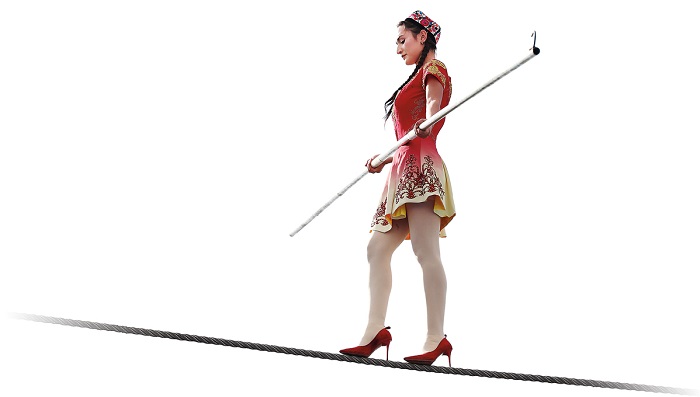National ethnic games promote traditional sports, instill harmony

A woman from Xinjiang team demonstrates Dawaz — acrobatic Uygur tightrope walking, on Nov 27, during the 12th National Traditional Games of Ethnic Minorities of China. WEI XIAOHAO/CHINA DAILY
Generational bonds
The Hua Pao competition held in a seaside stadium in Lingshui Li autonomous county, produced one of the games' most heartwarming moments when 46-year-old Qin Weiwei and his 21-year-old son, Qin Zhenyu, shared the field together.
With a history spanning over 500 years, Hua Pao began as a ritual among communities in Guangxi Zhuang autonomous region as well as Guangdong and Yunnan provinces, and was traditionally held on riverbanks and mountain slopes.
It involves two teams of eight players competing on a 60 by 50 meter field. A team scores by tossing a rubber disc — resembling a colorful wheel — into the opponent's basket.
Due to its blend of physical strength, teamwork and strategic play, Hua Pao has been called "Chinese rugby".
It was recognized as a National Intangible Cultural Heritage in 2021.
For Qin Zhenyu, stepping onto the field wasn't just about competition, but also carrying forward a family tradition. Watching his father dominate the sport, Qin Zhenyu was inspired to join Guangxi's Hua Pao team after his talent was noticed.
On the first day of the competition, the father-son duo made their mark against the Hunan province team. Qin Zhenyu shone, scoring his first "cannon shot," while his father offered guidance from the bench before taking the field.
"Watching my son play is more nerve-wracking than competing myself," said Qin Weiwei.
"I remind him of the details to watch out for (and) where he can improve," he said, adding that his son's debut was "not bad at all."
Guangxi's captain Wei Kaixuan, a high school physical education teacher, has worked to promote the sport and turned his school into a training center to help inspire the next generation of players.
Sports education student Wei Zongjiang, one of the team's newcomers, said his uncle introduced him to Hua Pao.
He said he has in turn introduced the sport to his fellow students, sparking interest in Hua Pao among younger people.
Team Guangxi lost to Team Beijing in the final. For many spectators, it was likely the first time they'd seen the sport live.
"By putting on our best performances and jointly lifting the competitive level of Hua Pao, we can make more young people interested in it and take part in it just like my son. Maybe one day there will be international Hua Pao events, just like rugby," Qin Weiwei suggested.
Unlike other multisports events with tight competition schedules, the games have a day dedicated to a grand party and gala for all 56 ethnic groups to showcase their traditions and cultural heritage.
This time, the athletes from different ethnic groups shared their favorite music and watched the sunset together at the beach at Tianya Haijiao Scenic Spot, and gained a deeper understanding of each other.
Xinhua contributed to this story.














